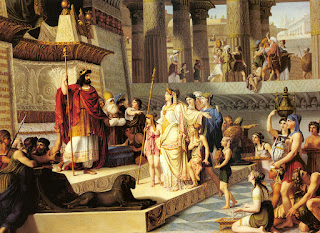The Biblical Age of Kings #2: The Allure of Wisdom
As we continue our study on the books of 1 & 2 Kings, we
reach the apparent pinnacle of Israel's greatness in 1 Kings 4:29-34. (It's 5:9-14 in the Hebrew text). Solomon seems to be the
greatest king ever for the small and otherwise insignificant nation of Israel. His
wisdom, wealth and glory put Israel on the map of world powers. Solomon
maximized the potential of Israel, at least in an economic and geopolitical
sense. He was a master of public relations, churning out loads of artistic
material and know-how, making him the envy of world leaders near and far.
This chapter and the surrounding
narrative also contain a cynical undercurrent. While the story of Solomon speaks of
great bounty and success, it also calls into question the nature of a Solomonic
kingdom. God does not hold back in giving Solomon a wise mind and discerning
heart, but this seems to produce in Solomon a man who suffers from memory loss.
Although God is blessing him richly, he seems to quickly forget that "the fear
of the Lord is the beginning of knowledge" (Prov 1:7). Solomon gets so
accustomed to being the star of the show that he fails to properly honor God
with humility and obedience in his personal life (11:1ff).
This brings up some interesting questions about wisdom. Why do
people become so enamored with the wisdom of powerful rulers and celebrities? Is
their wisdom really better than that of "simple" farmers, laborers, parents
& others? What kind of wisdom should the people of God seek out? Is there a general category of Wisdom that all people should ideally seek out?
Some of the Old Testament's wisdom literature has been
attributed to Solomon or tied to his school of thought: books such as Proverbs, Ecclesiastes and Song of Songs. The messages of these books seek to shape the character
of Godly people. They seek to guide us between the poles of legalism and chaos.
Clearly, that’s the purpose of God's Wisdom: to help us navigate the challenges
of life & still come out standing on the other end. Wisdom opens our eyes
to life's most meaningful and not just pressing concerns, and to help us
understand the priority of the important over the tyranny of the urgent.
 It's not clear whether Solomon himself ever
fully understood this as the goal of wisdom. He clearly had access to all the
wisdom a person could ever need. As biblical writers reflect on his life and
his sayings, they see in Solomon both a worthy goal (initially) and a troublesome
warning (in the end). In Jesus, however, we see the personification of Wisdom
that Solomon ultimately failed at. While Solomon's vast knowledge and
understanding increased his reputation and made him one of the marvels of the
ancient world, his inability to apply wisdom to himself cost him and Israel
dearly. Solomon may have been the perfect Renaissance man. He was the Dos Equis
man before there ever was Dos Equis. But he failed at applying wisdom to his
own life. Only in Jesus do we finally discover what Wisdom in the flesh really
looks like. And only through Jesus do we have the chance to live a life shaped
by Wisdom.
It's not clear whether Solomon himself ever
fully understood this as the goal of wisdom. He clearly had access to all the
wisdom a person could ever need. As biblical writers reflect on his life and
his sayings, they see in Solomon both a worthy goal (initially) and a troublesome
warning (in the end). In Jesus, however, we see the personification of Wisdom
that Solomon ultimately failed at. While Solomon's vast knowledge and
understanding increased his reputation and made him one of the marvels of the
ancient world, his inability to apply wisdom to himself cost him and Israel
dearly. Solomon may have been the perfect Renaissance man. He was the Dos Equis
man before there ever was Dos Equis. But he failed at applying wisdom to his
own life. Only in Jesus do we finally discover what Wisdom in the flesh really
looks like. And only through Jesus do we have the chance to live a life shaped
by Wisdom.



Comments